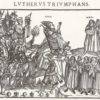Tag: Against
The Miracle of the Gospel against Worldviewism
When we think of ‘worldview’ as an analytic tool, in order to categorize various belief systems worldwide, we often think, as Christians, that we have a spot in that type of indexing. But I am not ultimately a proponent of thinking of the Christian reality in the philosophical terms presupposed for thinking in terms of a worldview. Even so, insofar as this discipline of intellection goes, it can be helpful in at least providing a sense of order in regard to thinking about the various juxtapositions of the various ‘belief systems’ that populate the world, and its peoples. But at…
Against Speculative Scholastic Theologies: For Confessional Cruciform Theologies
Being a genuine Christian theologian starts at the point that we become Christians. The same confession made to become a Christian, is the same confession that remains as the ground of our theological witnesses as Christians. The fact of our sin never leaves us. We are constantly sinning, and the person who says otherwise “is a liar and the truth is not in them.” But the Good News, indeed, is that we have an Advocate with the Father; we have a Savior, and His name is Jesus Christ! This is the ground of all Christian theologizing; the only other ground…
Barmen, Barth, and Agamben against BigMedicine as State Church
I was just re-reading the following post which I originally posted on September 13, 2021. I was looking for a post that got into the role that natural theology and no-natural theology plays in regard to Christian praxis vis-à-vis the state. This particular post has to do with BigMedicine, and what I call, along with Agamben, a new religion. Really it isn’t new at all though. Hitler rationalized that what he was doing, in pushing forward his third reich, was being done in the name of medical and scientific advancement (thus cultural advancement ushering in a new millennium where he would be…
Calvin in Barth’s Services on an ‘analogy of relation’ against Natural Theology and Her ‘Resourcers’ in scholasticism Reformed
Knowledge of God is the key, that is to the ‘secret of creation.’ If “Jesus Christ is indeed the real ground of creation,”[1] then in order to know what in fact creation is for, we must first know its Creator. But as Karl Barth underscores, in a rather Athanasian key, if Jesus is the ground of creation, and if Jesus is indeed the ‘Son of the Father,’ then to know the inner-ground, the secret of creation is first to know Jesus, to know the Son. As such, prior to knowing what and who creation is for, as the case may…
Against ‘Penal Substitution’ and Transactional Models::For an Ontological Theory of Atonement
Matthias Grebe continues in his trek of offering a critique of Barth through Barth in regard to the loci of election and atonement. In his task he offers up a description, here in summary form, of various atonement theories propounded by the church fathers. He points out, rightly, that the fathers, in the main, (barring Augustine) would have rejected the penal substitutionary atonement (PSA) theory, and instead operated with a Christus Victor model, generally. He argues that the ’victim theory’ (his language for PSA) would not have been countenanced by them, and that instead something like Thomas F. Torrance’s theory…
What Does Barth’s Trinitarian Actualism Mean? Against the Monad
When in the realm of Barth studies, you will often hear of ‘Barth’s actualism.’ But what in fact is actualism in Barth’s theology? And might it, once understood, offer the way out of the classical modes of thought in regard to God’s relation to the world through the decretum absolutum (‘absolute decree’)? In other words, could Barth’s actualism allow us to understand God’s ways vis-à-vis the world in such a way that God is no longer understood to be a static monad, but instead, a relational and personalist God, who indeed is constituted by his perichoretic co-inhering relations as Father,…
Against Winsomeness Because of God’s Holiness
Someone I know from online recently wrote a viral article for First Things where he gently critiques the approach of Tim Keller. His primary critique was of the ‘winsome’ and purported ‘third wayism’ that Keller has operated with for the last couple of decades, and even further back. My friend, James Wood, made some appeal to sociological analysis as a way into making his critique of Keller. In nuce, the argument was that Keller’s winsome approach may have had some resonance in the last decade or so, but that we have moved into times that aren’t as receptive to Christian…
Martin Luther Against Aristotle’s Nicomachean Ethics and the Post Reformed orthodox
Martin Luther, as I have referred to previously, was indeed anti-Aristotelian, particularly with reference to Aristotle’s anthropology as that effused throughout his Nicomachean Ethics. Indeed, Luther makes his disgust toward Aristotle’s Ethics, and thus, anthropology, very clear in his theological protestations, as he nailed those, just a month prior to his 95 theses, to the Wittenberg door. This was the real reason for Luther’s reformation, as my former professor and mentor, Dr Ron Frost, has so clearly argued. Luther saw Pelagian wickedness in Aristotle’s anthropology, and of course insofar as Aquinas appropriated Aristotle’s Ethics, among other things, this compelled Luther…
The Contemporary Reformed Are Recovering Catholic Modes of Thinking and Thus Spirituality: The Genuine Protestant Way Against Analogia Entis
If you’re a Catholic or scholastic Protestant thinker, you’ll follow along with Erich Przywara’s dictum (following Thomas’) of ‘revelation perfecting revelation.’ You’ll see a continuity between the naked philosopher’s machinations, and what comes in perfection through God’s Self-revelation in Jesus Christ. You’ll maintain that humanity, since it is born into an iteration of God’s grace (which is an abstract creation), has the capacity, albeit, finite, to think towards the God of creation. On the other hand, if you’re a genuinely Protestant thinker who takes the noetic effects of the fall, who takes total depravity seriously, and who does not sublate…
Against the Theologians of Glory
I’ve written against theologies of glory ever since (and before) I heard of them. A life verse of mine (among a gazillion) is the following: “For I’ve determined to know nothing among you except Jesus Christ and Him crucified.” This typifies the staurological life I live the Christian as, from the cruciformed life of the risen Christ’s (or at least the one I aim for). Because of this I have an acute allergy to anyone who chooses instead to be a theologian of glory. Jesus identifies theologians of glory this way: “I do not receive honor from men. But I know…








